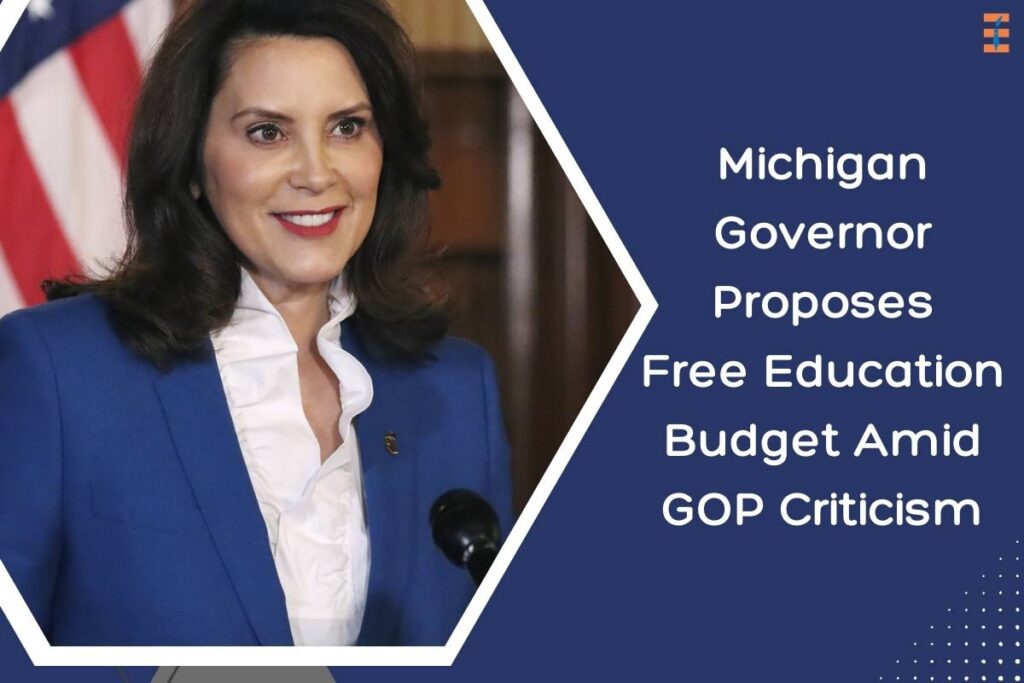Source- ClickOnDetroit
Michigan Governor Gretchen Whitmer presented her budget proposal of $80.7 billion on Wednesday, focusing on bolstering education spending and fulfilling her pledge to offer free education from preschool through community college. In a joint session between the House and Senate appropriations committees, the second-term Democratic governor outlined her vision, emphasizing initiatives such as free community college for all high school graduates, free preschool for 4-year-olds, and the continuation of a free breakfast and lunch program for all students.
“My budget today will deliver on the vision I outlined a couple of weeks ago,” Whitmer affirmed to lawmakers. “Lowering costs, improving education, and ensuring that anyone and everyone can make it here in Michigan.”
Despite Whitmer’s focus on education and cost reduction, Republican Senate Leader Aric Nesbitt criticized the budget, denouncing it as mere “public relations talking points.” He argued that the proposal favored excessive tax incentives for businesses over support for families, labeling it unfair to Michigan families grappling with rising grocery bills and energy prices.
However, Whitmer defended her budget, citing its aim to lower costs and grow Michigan’s economy. She highlighted estimates indicating that free breakfast and lunch for Michigan’s 1.4 million public school students would save families an average of $850 annually, while free community college would save families an average of $4,820.
Challenges and Controversies Surrounding Whitmer’s Budget Proposal
The proposed $80.7 billion budget represents a slight decline from the current fiscal year’s $82 billion budget. Jen Flood, the state budget director, described the proposal as a “return to normal” following large surpluses resulting from COVID-era funds.
As lawmakers begin deliberations, they face a self-imposed July 1 deadline to pass their budget for the 2025 fiscal year, beginning October 1. However, with the state House deadlocked and no indication of Republican support for Democratic priorities, passing Whitmer’s budget may prove challenging.
Republican House Leader Matt Hall criticized Whitmer’s proposal, alleging it was “out of step with the people of Michigan” and failed to provide “real value for their tax dollars.” As the budget debate unfolds, Michigan’s educational landscape and economic future hang in the balance amidst partisan discord.
Whitmer’s budget proposal, centered on education and cost reduction, has elicited mixed reactions from the public. Supporters commend the governor’s commitment to making education more accessible and affordable for Michigan residents, particularly in the wake of economic challenges exacerbated by the pandemic. Advocates argue that initiatives like free community college and expanded pre-K programs will not only benefit individual families but also strengthen the state’s workforce and economy in the long run.
Challenges and Opportunities in Passing Whitmer’s Budget Proposal
Conversely, critics, primarily from the Republican party, remain skeptical of the budget’s efficacy and fairness. They raise concerns about the allocation of resources, emphasizing the need for a balanced approach that prioritizes both business incentives and family support. Additionally, questions linger regarding the feasibility of sustaining such initiatives without imposing undue financial burdens on taxpayers or sacrificing other essential services.
As the budget proposal moves through the legislative process, lawmakers must navigate complex political dynamics and competing interests to reach a consensus. The deadlock in the state House further complicates matters, potentially prolonging deliberations and heightening tensions between parties.
Ultimately, the fate of Whitmer’s budget hinges on the ability of lawmakers to find common ground and prioritize the best interests of Michigan residents. Whether the proposed initiatives come to fruition or undergo significant revisions remains uncertain, but one thing is clear: the outcome will have far-reaching implications for the state’s educational system, economy, and overall well-being. As stakeholders continue to weigh in and negotiations unfold, all eyes are on Lansing, awaiting the resolution of this critical budgetary debate.
Also Read: The Top Companies in Education Shaping the Future of Education










